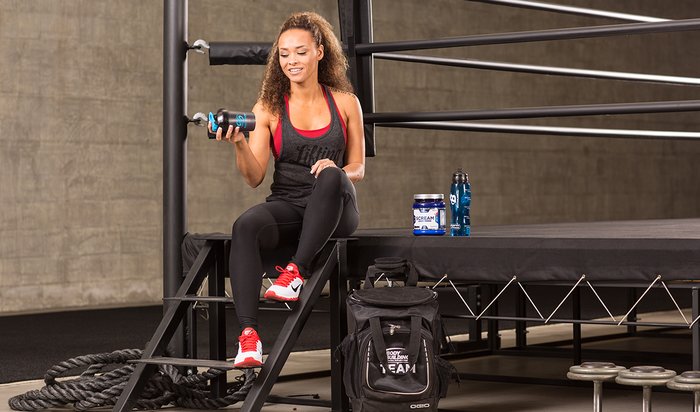Ask 50 gym rats what the benefits of whey protein are, and you'll probably get a more or less accurate response a majority of the time. Ask them what beta-alanine does, and you'll probably hear something along the lines of "it gives me a tingly feeling in my face and hands and lets me know my pre-workout is working." The truly informed might flesh this out with something like "it helps me get one more rep...or is that creatine?"
If that sounds like you, it's time to take some notes! When you use it correctly—and most people don't—beta-alanine can help take your training to a whole new level in a number of ways. Here's what you need to know, and how to take it right!
1. Beta-Alanine Delays Fatigue During Intense Cardio
This is the one you might know, so let's deal with it first.
When you train at higher intensities, you accumulate hydrogen ions, which lowers your blood's pH levels and contributes to fatigue. Carnosine, the amino acid that beta-alanine helps to produce in your body, serves to buffer hydrogen ions, allowing you to work at higher intensities for longer periods of time.[1] Most of the research surrounding beta-alanine suggests that it's most beneficial for high-intensity activities lasting 2-4 minutes, such as high-intensity interval training.[2,3]

Combining beta-alanine with high-intensity cardio can lead to improvements in fat loss and muscle gain.
So how much does it help? A study published in the Journal of the International Society of Sports Nutrition found that soccer players who supplemented with beta-alanine over a 12-week period improved sprinting performance by over 20 percent. Those taking the placebo actually declined in performance.[3]
Another study from researchers at The University of Oklahoma found that supplementation with beta-alanine significantly delayed the onset of fatigue in women during a maximal cycling test to exhaustion.[4]
The takeaway: To get the most from your beta-alanine, bring on the sprints, tire flips, and fan-bike meltdowns!
2. Beta-Alanine Helps Preserve Muscle Mass
A supplement that helps you maintain intensity during sprints and HIIT has great potential for fat loss. But what about the muscle loss that often accompanies that fat loss? Beta-alanine appears to help there as well.
Several studies have investigated the efficacy of beta-alanine coupled with HIIT to improve body composition, with relative success. What's more surprising is that most of these studies actually found improvements in lean mass, not just a drop in body fat. In fact, researchers from the University of Oklahoma found that recreationally active men who supplemented with beta-alanine during 6 weeks of HIIT actually experienced a significant increase in lean body mass.[5]
Supporting these findings, a study published in the Journal of Strength and Conditioning reported significant increases in muscle mass following eight weeks of HIIT in collegiate wrestlers and football players.[6] For the wrestlers, both the placebo and beta-alanine groups lost weight, which was the goal. However, the beta-alanine group increased lean mass by 1.1 pounds, whereas the placebo group lost a pound of lean mass on average.
The takeaway: In combination with high-intensity cardio, beta-alanine can lead to improvements in fat loss and muscle gain—or at least muscle maintenance—while cutting.
3. Beta-Alanine Enables Greater Training Volume
At this point, you might be thinking beta-alanine is only good for cardio. But don't worry, it offers plenty to iron addicts, too!
Progressively increasing volume over time is one of the most effective ways to increase strength and muscle size. So, how do you do it? Simply perform more reps, complete additional sets, or put more weight on the bar. It looks easy enough on paper, but seasoned lifters know better.

Supplementing with beta-alanine has been shown to increase overall training volume, ultimately leading to superior muscular adaptations.
Similar to its effects during anaerobic cardio activities, beta-alanine appears to delay fatigue and increase performance in the weight room. Researchers at The College of New Jersey found that 30 days of supplementation with 4.5 grams per day improved both resistance-training volume and perceptions of fatigue in collegiate football players.[7]
The takeaway: Beta-alanine might help you manage a few extra sets and reps, leading to a greater training volume, and ultimately, superior muscular adaptations.
4. Beta-Alanine Can Sharpen Tactical Skills
Supplementing with beta-alanine increases carnosine levels. Not only is carnosine found in skeletal muscle, it it's also found in high quantities in the brain. The same energy-promoting and fatigue-resistant qualities of carnosine that apply to your muscles might also help anyone whose job or sport requires a high level of tactical thinking.
In a study published in the Journal of the International Society of Sports Nutrition, researchers found improvements in not only peak power among combat soldiers supplementing with beta-alanine, but also marksmanship and target engagement speed as compared to a placebo.[8] A subsequent study out of the University of Central Florida found supplementation with beta-alanine improved cognitive function and performance on a simulated casualty carry.[9]
The takeaway: Having beta-alanine in your stack may help you stay clear-headed during intense activities, not just delay physical fatigue.
5. Beta-Alanine Can Make Creatine Work Better
Just like grilled cheese and tomato soup, creatine and beta-alanine are better together.
In one study, creatine plus beta-alanine led to a significant increase in lean body mass and a significant drop in body fat following a 10-week resistance-training program.[10] A second study published in Amino Acids found that supplementing with creatine and beta-alanine improved athletes' endurance relative to creatine or beta-alanine alone.[11]

Taking beta-alanine consistently is more important than how or when you take it. To reap the benefits, make sure you're supplementing with 3.2-6 grams every day.
The takeaway: Creatine and beta-alanine belong together in your stack. Both also demand loading, though. So whenever you take one, take the other!
The Right Way To Take Beta-Alanine
Aside from diet, most people rely on pre-workouts to deliver their beta-alanine. However, if this is your approach, you're likely short-changing yourself. Most pre-workouts contain a dose too low to be effective, and most folks don't take pre-workouts regularly enough to reap the benefits of beta-alanine, which really only occur after a loading phase.
The simplest and most effective way to maximize the benefits of beta-alanine is to take it consistently, like you would with creatine or a multivitamin. It helps that beta-alanine is a relatively inexpensive supplement!
I recommend supplementing initially with 4-6 grams per day, as a majority of the research has shown this is enough to increase muscle carnosine stores.[12] As with creatine, you need to be consistent with beta-alanine supplementation, as it takes about four weeks to maximally saturate your muscle cells. After that, 3.2-4.0 grams a day should be sufficient to maintain your levels.
When you start loading, you can expect to experience paresthesia, a common—and harmless—side effect of beta-alanine supplementation, which expresses as a brief tingling feeling on the face, neck, or hands. It's most pronounced with large doses, so if you're not a fan of the feeling, consider breaking up your supplement into two or three smaller doses of around 800 milligrams throughout the day.[14] As long as your total daily intake is sitting around 4-6 grams, you'll still increase your muscle carnosine stores and performance.
As with creatine, taking beta-alanine consistently is more important than how or when you take it. If you lead an athletic life, make this valuable supplement a part of your daily routine!
References
- Harris RC, Stellingwerff T. Effect of beta-alanine supplementation on high-intensity exercise performance. Nestle Nutrition Institute Workshop Series, 76, 61-71.
- Trexler, E. T., Smith-Ryan, A. E., Stout, J. R., Hoffman, J. R., Wilborn, C. D., Sale, C., ... & Campbell, B. (2015). International society of sports nutrition position stand: Beta-Alanine. Journal of the International Society of Sports Nutrition, 12(1), 1-14.
- Saunders, B., Sunderland, C., Harris, R. C., & Sale, C. (2012). Beta-alanine supplementation improves YoYo intermittent recovery test performance. Journal of the International Society of Sports Nutrition, 9(1), 1-5.
- Stout, J. R., Cramer, J. T., Zoeller, R. F., Torok, D., Costa, P., Hoffman, J. R., ... & O'kroy, J. (2007). Effects of beta-alanine supplementation on the onset of neuromuscular fatigue and ventilatory threshold in women. Amino Acids, 32(3), 381-386.
- Smith, A. E., Walter, A. A., Graef, J. L., Kendall, K. L., Moon, J. R., Lockwood, C. M., ... & Stout, J. R. (2009). Effects of beta-alanine supplementation and high-intensity interval training on endurance performance and body composition in men; a double-blind trial. Journal of the International Society of Sports Nutrition, 6(1), 1-9.
- Kern, B. D., & Robinson, T. L. (2011). Effects of beta-alanine supplementation on performance and body composition in collegiate wrestlers and football players. The Journal of Strength & Conditioning Research, 25(7), 1804-1815.
- Hoffman, J. R., Ratamess, N. A., Faigenbaum, A. D., Ross, R., Kang, J., Stout, J. R., & Wise, J. A. (2008). Short-duration beta-alanine supplementation increases training volume and reduces subjective feelings of fatigue in college football players. Nutrition Research, 28(1), 31-35.
- Hoffman, J. R., Landau, G., Stout, J. R., Dabora, M., Moran, D. S., Sharvit, N., ... & Ostfeld, I. (2014). Beta-alanine supplementation improves tactical performance but not cognitive function in combat soldiers. Journal of the International Society of Sports Nutrition, 11(1), 15.
- Hoffman, J. R., Landau, G., Stout, J. R., Hoffman, M. W., Shavit, N., Rosen, P., ... & Ostfeld, I. (2015). Beta-alanine ingestion increases muscle carnosine content and combat specific performance in soldiers. Amino Acids, 47(3), 627-636.
- Hoffman, J. R., Ratamess, N. A., Kang, J., Mangine, G., Faigenbaum, A., & Stout, J. (2006). Effect of creatine and beta-alanine supplementation on performance and endocrine responses in strength/power athletes. International Journal of Sport Nutrition and Exercise Metabolism, 16(4), 430-446.
- Zoeller, R. F., Stout, J. R., O'kroy, J. A., Torok, D. J., & Mielke, M. (2007). Effects of 28 days of beta-alanine and creatine monohydrate supplementation on aerobic power, ventilatory and lactate thresholds, and time to exhaustion. Amino Acids, 33(3), 505-510.
- Harris, R. C., Tallon, M. J., Dunnett, M., Boobis, L., Coakley, J., Kim, H. J., ... & Wise, J. A. (2006). The absorption of orally supplied beta-alanine and its effect on muscle carnosine synthesis in human vastus lateralis. Amino Acids, 30(3), 279-289.

